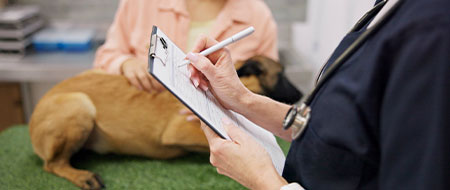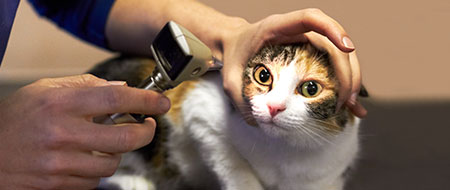That’s why regular check-ups are essential—especially for pets over 8 years old.
Because pets age so quickly, subtle changes in behavior or energy can be signs of underlying health issues. And since we see them every day, those signs can be easy to miss.
At Fullerton Pet Clinic, we recommend wellness exams every six months for senior pets. These visits allow us to catch changes early—before they become more serious or harder to treat.
Why Senior Wellness Exams Matter
- Appetite and weight changes
- Drinking and urination patterns
- Activity level and mobility
- Behavior at home
- Anything unusual you’ve noticed
- Heart and lungs
- Eyes, ears, and teeth
- Muscles and joints
- Skin and coat
- Neurological and abdominal health
What to Expect During the Exam

Step 1: A Thorough History
We start by asking detailed questions about your pet’s health and daily habits, including:
- Appetite and weight changes
- Drinking and urination patterns
- Activity level and mobility
- Behavior at home
- Anything unusual you’ve noticed

Step 2: A Full Physical Exam
Next, we perform a nose-to-tail exam to check your pet’s:
- Heart and lungs
- Eyes, ears, and teeth
- Muscles and joints
- Skin and coat
- Neurological and abdominal health
- Diet changes or nutritional supplements
- Starting medication or treatment
- Managing chronic conditions
- Pain relief and mobility support
Let’s Keep Them Feeling Young
Your pet may not show you when something’s wrong. That’s why regular senior wellness exams are so important. The earlier we detect a problem, the easier it is to manage—and the more time you’ll have with your beloved companion.
Schedule a senior wellness exam today and give your pet the care they deserve.

